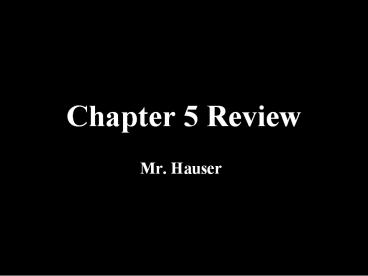Chapter 5 Review PowerPoint PPT Presentation
1 / 59
Title: Chapter 5 Review
1
Chapter 5 Review
- Mr. Hauser
2
Rules of the Game
- Working in TEAMS, you will be asked to answer
questions from the assigned chapters. - You have 30 seconds to write the answer down on
the dry erase board. - When the teacher says TIMES UP, a team leader
will stand up and show the teacher their answer.
3
Rules (Continued)
- Each correct answer is worth one point, unless
otherwise stated. - Teams can lose points for inappropriate conduct,
comments, or cheating. - The team with the most points at the end of the
game wins!
4
Question 1
- A force applied over a distance is called
____________.
5
ANSWER
- Work
6
Question 2
- What are the metric units used to measure Work?
(Write out the word.)
7
ANSWER
- Joules
8
Question 3
- Energy of motion is called
- Potential
- Work
- Kinetic
- Chemical
9
ANSWER
- Kinetic
10
Question 4
- What are the metric units used to measure power?
(Write out the word)
11
ANSWER
- Watts
12
Question 5
- A force of 45 Newtons acts on an object at an
angle of 50 degrees above the horizontal pulling
it 3 meters. How much work was done? (you must
have the proper units with your answer)
13
ANSWER
- 86.8 Joules
14
Question 6
- The rate at which work is done is called ______.
15
ANSWER
- Power
16
Question 7
- Power is ________ related to time.
- A) directly
- B) inversely
- C) quadratically
- D) linearly
17
ANSWER
- B) inversely
18
Question 8
- When the force acting on an object is opposite
the direction of motion of the object, _________
work is done.
19
ANSWER
- negative
20
Question 9
- _________ is defined as the ability to cause
change or the ability to do work.
21
ANSWER
- Energy
22
Question 10
- If an object doubles its mass, its potential
energy will ________. - be halved
- double
- quadruple
- be reduced to one fourth
23
ANSWER
- B) double
24
Question 11
- If an object doubles its speed its kinetic energy
will... - be halved.
- double.
- quadruple.
- be reduced to one fourth.
25
ANSWER
- C) quadruple
26
Question 12
- List five types of non-mechanical energy we
discussed in class.
27
ANSWER
- Nuclear (atomic), Thermal, Chemical, Electrical,
Light (radiant)
28
Question 13
- This is considered stored energy or energy of
position.
29
ANSWER
- Potential energy
30
Question 14
- A bird is flying above the ground. What type or
types of mechanical energy does it have? (be as
specific as possible)
31
ANSWER
- Gravitational potential energy and kinetic energy
32
Question 15
- How much horsepower do you have if your mass is
75 kg, and you can climb the steps that are 3.29
meters high in a time of 2.3 seconds?
33
ANSWER
- 1.4 horsepower
34
Question 16
- How much work is done to lift a 45 kg weight up a
distance of 6.2 meters at a constant velocity?
35
ANSWER
- 2,734 Joules
36
Question 17
- How much work must be done by a force to
accelerate a 1800kg car from 4.5 m/s to 27 m/s?
(show units)
37
ANSWER
- 638,000 Joules
38
Question 18
- In the lab, we found the work done on the bow by
pulling it back by finding the ________ under the
graph of force vs. displacement.
39
ANSWER
- area
40
Question 19
- A rollercoaster starts from rest on top of its
hill. It drops and moves through the bottom of
the hill. What types of mechanical energy did
the roller coaster have at the top and at the
bottom? (Be as specific as possible)
41
ANSWER
- Gravitational Potential Energy at the top and
Kinetic Energy at the bottom
42
Question 20
- Energy can neither be created nor destroyed but
it can be converted from one form to another.
This statement is called ______.
43
ANSWER
- Law of Conservation of Energy
44
Question 21
- Write the long form of the equation for the Law
of Conservation of Energy.
45
ANSWER
- KEf PEf KEi Pei (Wfriction)
46
Question 22
- All of the energy lost in a machine due to
friction ends up in the form of ________.
47
ANSWER
- Heat
48
Question 23
- The energy that you use to move around all day
long indirectly comes from what?
49
ANSWER
- The sun
50
Question 24
- When a spring is stretched four times further
than its relaxed position, by what factor does
its elastic potential energy increase?
51
ANSWER
- 16 times
52
Question 25
- A skier moves over top of a hill at 5.4 m/s and
then drops 6.4 m down its surface. The hill is
frictionless. What is the velocity of the skier
at the bottom of the hill?
53
ANSWER
- 12.4 m/s
54
Question 26
- A spring with with a spring constant of 890 N/m
is compressed such that it has 6.4 Joules of
elastic potential energy. How far was it
compressed?
55
ANSWER
- 0.12 meters
56
Question 27
- An 4.5 kg model airplane slows from 9.3 m/s to
rest with a force of 22 N. How far did it travel
during while slowing down?
57
ANSWER
- 8.8 meters
58
FINAL QUESTION
- A roller coaster goes 14 m/s over its second
hill, which is 22 meters high. It started from 3
m/s on top of its first hill. How high was the
first hill?
59
ANSWER
- 31.5 meters

